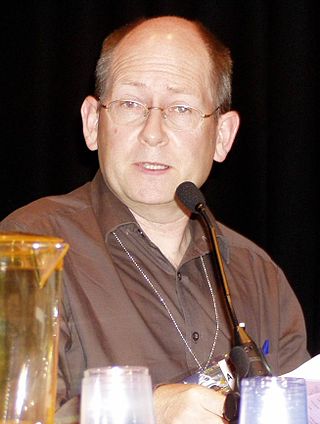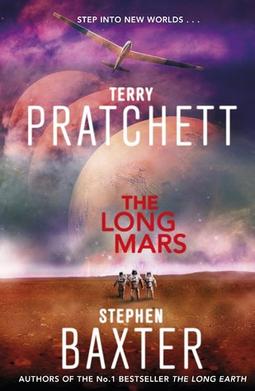
Sir Terence David John Pratchett was an English humorist, satirist, and author of fantasy novels, especially comical works. He is best known for his Discworld series of 41 novels.

Stephen Baxter is an English hard science fiction author. He has degrees in mathematics and engineering.

Good Omens: The Nice and Accurate Prophecies of Agnes Nutter, Witch is a 1990 novel written as a collaboration between the English authors Terry Pratchett and Neil Gaiman.

An overwhelming majority of fiction is set on or features the Earth, as the only planet home to humans. This also holds true of science fiction, despite perceptions to the contrary. Works that focus specifically on Earth may do so holistically, treating the planet as one semi-biological entity. Counterfactual depictions of the shape of the Earth, be it flat or hollow, are occasionally featured. A personified, living Earth appears in a handful of works. In works set in the far future, Earth can be a center of space-faring human civilization, or just one of many inhabited planets of a galactic empire, and sometimes destroyed by ecological disaster or nuclear war or otherwise forgotten or lost.

The Colour of Magic is a 1983 fantasy comedy novel by Terry Pratchett, and is the first book of the Discworld series. The first printing of the British edition consisted of only 506 copies. Pratchett has described it as "an attempt to do for the classical fantasy universe what Blazing Saddles did for Westerns."
The Big Read was a survey on books carried out by the BBC in the United Kingdom in 2003, where over three-quarters of a million votes were received from the British public to find the nation's best-loved novel. The year-long survey was the biggest single test of public reading taste to date, and culminated with several programmes hosted by celebrities, advocating their favourite books.

The Science of Discworld is a 1999 book by novelist Terry Pratchett and popular science writers Ian Stewart and Jack Cohen. Three sequels, The Science of Discworld II: The Globe, The Science of Discworld III: Darwin's Watch, and The Science of Discworld IV: Judgement Day, have been written by the same authors.

The Discworld Companion is an encyclopaedia of the Discworld fictional universe, created by Terry Pratchett and Stephen Briggs. Four editions have been published, under varying titles.

Rainbow Mars is a 1999 science fiction short story collection by American writer Larry Niven. It contains six stories of Hanville Svetz, five previously published and the longest, "Rainbow Mars", written for the collection. The setting of the Svetz stories is Earth in the distant future. The hereditary leader of the Earth, known as the Secretary General, is an inbred imbecile. In order to maintain the interest of the Secretary, different factions in the capitol use their advanced science to amuse him. Svetz's section uses time travel in an attempt to bring back long extinct animals from Earth's past. Unbeknownst to Svetz and his team, they are actually travelling back into fictional pasts, and returning with mythical creatures.

The Discworld Diaries are a series of themed diaries based on the Discworld novels by Terry Pratchett. Each one is based on an Ankh-Morpork institution, and has an opening section containing information about that institution written by Pratchett and Stephen Briggs.

"The Brick Moon" is a novella by American writer Edward Everett Hale, published serially in The Atlantic Monthly starting in 1869. It is a work of speculative fiction containing the first known depiction of the launch of an artificial satellite.
Truckers is a British stop motion animated series, an adaptation of the first book of Terry Pratchett's The Nome Trilogy, produced in the United Kingdom by Cosgrove Hall for TV, then released on VHS, though edited together into a feature-length film. The series consisted of 13 ten-minute episodes.

Ankh-Morpork is a fictional city-state which features prominently in Terry Pratchett's Discworld fantasy novels.

Discworld is a comic fantasy book series written by the English author Terry Pratchett, set on the Discworld, a flat planet balanced on the backs of four elephants which in turn stand on the back of a giant turtle. The series began in 1983 with The Colour of Magic and continued until the final novel The Shepherd's Crown, which was published in 2015, following Pratchett's death. The books frequently parody or take inspiration from classic works, usually fantasy or science fiction, as well as mythology, folklore and fairy tales, and often use them for satirical parallels with cultural, political and scientific issues.

The Long Earth is the first novel in a collaborative science fiction series by British authors Terry Pratchett and Stephen Baxter.

The Long War is a science fiction novel by British writers Terry Pratchett and Stephen Baxter. It is a sequel to their parallel-Earth novel The Long Earth. This book is the second in a five-book series.

The Long Mars is a science fiction novel by Terry Pratchett and Stephen Baxter.

The Long Utopia is a science fiction novel by Terry Pratchett and Stephen Baxter published on 23 June 2015.

The Shepherd's Crown is a comic fantasy novel, the last book written by Terry Pratchett before his death in March 2015. It is the 41st novel in the Discworld series, and the fifth based on the character Tiffany Aching. It was published in the United Kingdom on 27 August 2015 by Penguin Random House publishers, and in the United States on 1 September 2015.
The Long Earth is a collaborative science fiction novel series by British authors Terry Pratchett and Stephen Baxter.
















